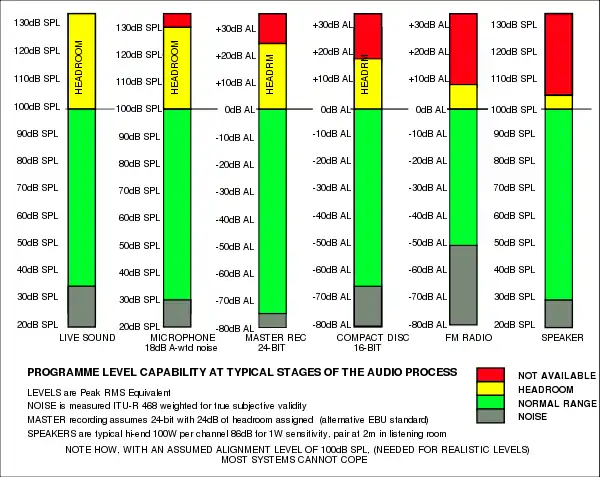Headroom (audio signal processing)
In digital and analog audio, headroom refers to the amount by which the signal-handling capabilities of an audio system exceed a designated nominal level.[1] Headroom can be thought of as a safety zone allowing transient audio peaks to exceed the nominal level without damaging the system or the audio signal, e.g., via clipping. Standards bodies differ in their recommendations for nominal level and headroom.
Digital audio
In digital audio, headroom is defined as the amount by which digital full scale (FS) exceeds the nominal level in decibels (dB). The European Broadcasting Union (EBU) specifies several nominal levels and resulting headroom for different applications.
| Application | Headroom |
|---|---|
| FM broadcasts | −9 dBFS |
| Digital broadcasts and ordinary digital recordings | −18 dBFS |
| Original master recordings | −24 dBFS |
Analog audio
In analog audio, headroom can mean low-level signal capabilities as well as the amount of extra power reserve available within the amplifiers that drive the loudspeakers.
Alignment level
Alignment level is an anchor point 9 dB below the nominal level, a reference level that exists throughout the system or broadcast chain, though it may imply different voltage levels at different points in the analog chain. Typically, nominal (not alignment) level is 0 dB, corresponding to an analog sine wave of voltage of 1.23 volts RMS (+4 dBu or 3.47 volts peak to peak). In the digital realm, alignment level is −18 dBFS.
- AL = analog level
- SPL = sound pressure level

See also
References
- "Q. What exactly is 'headroom' and why is it important?". Sound on Sound. February 2010.
Further reading
- BS.1726 "Signal level of digital audio accompanying television in international programme exchange" (2005)
- BS.1864 "Operational practices for loudness in the international exchange of digital television programmes" (2010)
- BS.1770-3 "Algorithms to measure audio programme loudness and true-peak audio level" (2012)
External links
- EBU Recommendation R68-2000
- AES Preprint 4828 - Levels in Digital Audio Broadcasting by Neil Gilchrist (not free)
- EBU Recommendation R117-2006 (against loudness war)
- AES Convention Paper 5538 On Levelling and Loudness Problems at Broadcast Studios
- EBU Tech 3282-E on EBU RDAT Tape Levels
- AES17-1998 (r2004): AES standard method for digital audio engineering -- Measurement of digital audio equipment